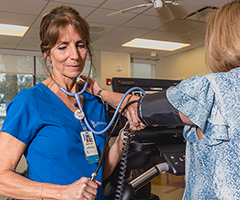Blood Tests
What are Blood Tests?
Blood tests help us diagnose, treat, and manage heart disease.
Your blood provides many hidden clues about your heart health. For example, high levels of "bad" cholesterol in your blood can be a sign that you're at increased risk of having a heart attack. And other substances in your blood can help your doctor determine if you have heart failure or face a risk of developing plaque in your arteries (atherosclerosis).
It's important to remember that one blood test doesn't always determine your risk of heart disease. The most important risk factors for heart disease are smoking, high blood pressure, high cholesterol, and diabetes.
How Are Blood Tests Done?
We may draw blood at a lab, in your hospital room, or the emergency room. Your blood is then sent to a central laboratory where we perform various tests. We will send your doctor a report with the lab results.
Schedule An Appointment Using MyChart
You don't need an appointment to schedule your blood work or other lab services, but if you would like to make an appointment ahead of time you can schedule your lab services through the MyChart app! Click one of the links below to get started!
10 Essential Cardiac Blood Tests:
- Lipid Blood Tests: Provides information on your levels of cholesterol and triglycerides, which are associated with the risk of heart disease.
- Lipoprotein, Homocysteine and Fibrinogen tests: These blood tests help determine your risk of developing coronary heart disease.
- C-reactive protein: A blood test that identifies high levels of inflammation and an increased risk for heart disease.
- Blood tests for anticoagulants: These tests help your doctor to determine if you are taking a safe level of blood thinners.
- Blood sugar tests: Several different tests determine if you have diabetes, how severe your diabetes has been, and whether your diabetes treatment is effective.
- B-type natriuretic peptide test: This blood test helps doctors identify and determine the severity of heart failure.
- Electrolyte test: This determines how effective various treatments are as well as detect liver, heart, and kidney disease.
- Blood count: Used to diagnose and monitor various heart conditions and the effectiveness of drugs or other treatments.
- Blood viscosity: used to determine the amount of friction against the blood vessels
Blood Tests at Lee Health
Lee Health operates several laboratories in Cape Coral, Fort Myers, and Estero. These labs offer the widest range of blood tests for the diagnosis and treatment of heart disease. At our labs, you'll have your blood work tested along with any other specimens requested by your healthcare provider.
You don't need an appointment to schedule your blood work or other lab services! All you need is your photo ID, your lab order, and insurance information.
Insurance We Accept: WebTPA, Medicare, Aetna, Tricare, Vivida, UHC Medicare AARP PPO, Naphcare, Cigna, Clarion.
-
Lab Services - Pine Island Rd
-
Lab Services - Plantation Rd
-
Lab Services - The Sanctuary
-
Lab Services - Surfside
-
Lab Services - Coconut Point
-
Lab Services - Cape Coral Hospital
-
Lab Services - Golisano Children's Health Center
-
Lab Services - HealthPark Commons
-
Lab Services - Lee Memorial Hospital
-
Lab Services - Golisano Children's Hospital



